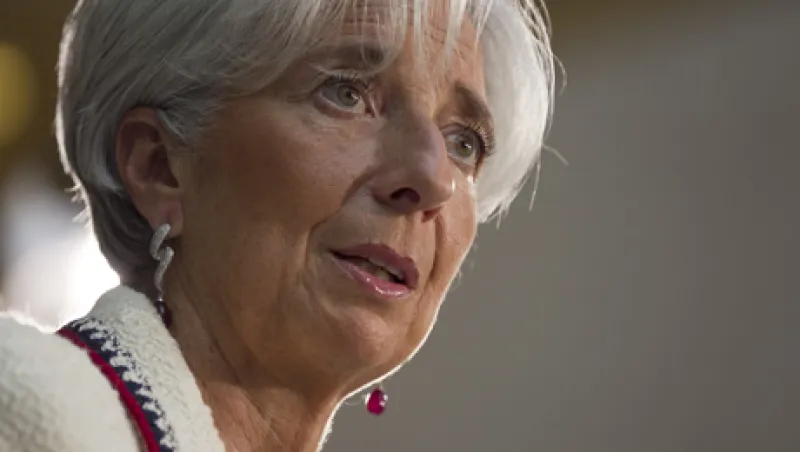Fresh from winning a $430 billion increase in resources to confront any renewed crisis in the euro zone, officials at the International Monetary Fund set to work this week with an overriding objective — making sure they never have to use that money.
That will be a tall order, judging by Monday’s market movements. The euro and European stocks fell, and spreads on European government bonds continued their recent widening trend after President Nicolas Sarkozy trailed Socialist rival François Hollande in the first round of voting in France’s presidential election and after the Dutch government collapsed because of disagreements over budget cuts. The developments suggested popular resistance to Europe’s austerity-first strategy of containing the debt crisis is growing.
The agreement on new resources reached at the spring meetings of the IMF and World Bank in Washington over the weekend represented a victory of sorts for the Fund’s managing director, Christine Lagarde. She had campaigned for the past four months to bolster the so-called financial firewall against any new outbreak of Europe’s debt crisis, and did so in the face of resistance from the U.S. Treasury, which refused to stump up any cash and insisted it was up to the Europeans themselves to bolster their own defenses.
Lagarde had to lower her sights. The total fell short of the $600 billion she initially sought, and it contained relatively little outside money. European Union nations will provide more than half of the funds, some $242 billion. The BRIC nations dragged their feet, promising to chip in about $70 billion collectively in a few months after internal deliberations in their respective capitals. With their show of reticence, Brazil, Russia, India and China made clear they want a bigger say in the Fund and will continue to press for faster changes in IMF quotas and votes before freely opening their wallets. This fall the Fund aims to complete a 2010 reform agreement, which increased modestly the quota and voting rights of emerging markets countries, before embarking on a more ambitious governance overhaul that would require European countries to give up substantial voting rights — and seats on the IMF board — to emerging markets countries.
With some of the new funds earmarked for the IMF’s liquidity reserves, the deal will roughly double the institution’s available lending resources, to around $700 billion. The IMF agreement follows the European Union’s decision last month to increase the size of its two bailout facilities by €200 billion, to a combined €700 billion ($910 billion). So the wherewithal for containing any renewed eruption of the debt crisis seems substantial.
Still, the amounts fall well short of the overwhelming firepower that U.S. officials have long urged the EU to amass. EU authorities and the IMF have already committed more than $500 billion to bailout programs in Greece, Ireland and Portugal. In recent weeks market participants have turned their attention to Spain, where the new government of Prime Minister Mariano Rajoy has admitted the government will overshoot its deficit target for this year. With Spanish bond yields rising almost to 6 percent this week, the government risks the same kind of debt spiral that forced Greece to seek an EU bailout.
The problem, fund officials say privately, is that any intervention in Spain could stretch EU and IMF resources to the limit. Spain’s borrowing needs approach $200 billion a year, and bailout deals so far have provided three years worth of funding. Any Spanish deal, moreover, could easily spark a run on Italian debt.
All of which leaves officials eager to avoid fresh bailouts and desperate for growth to break Europe’s debt trap. Poul Thomsen a senior Fund official who helped design the EU-IMF bailout programs for Greece, Ireland and Portugal, acknowledged at a weekend IMF seminar that all three countries faced a huge challenge to restructure their economies and restore growth. “If these programs only become about fiscal consolidation and financial deleveraging, they will obviously fail,” he said.
Europe has no quick fixes to jump-start growth, though. Germany, the only country that could conceivably act as an economic locomotive, rejects any talk of stimulus. The labor and product market reforms that crisis countries are pursuing to boost their competitiveness and restore growth will take years to pay off. Portugal, for instance, is likely to need a second EU-IMF bailout by September because budget cuts are deepening the country’s recession while structural reforms aimed at boosting growth will take years to pay off, according to a report last week by Daniele Antonucci and Paolo Batori, analysts at Morgan Stanley in London.
For anyone hoping Europe’s debt crisis had abated, Natacha Valla, chief economist at Goldman Sachs France, offered a sobering forecast at a seminar sponsored by the Banque de France in New York on Monday. Valla said that concerns about European debt sustainability and the health of banks that hold big chunks of that debt would persist for years, and that markets are likely to be roiled by repeated waves of risk aversion.
With the risks of multiple storms ahead, EU and IMF policymakers have ample reason to want to keep their powder dry.






